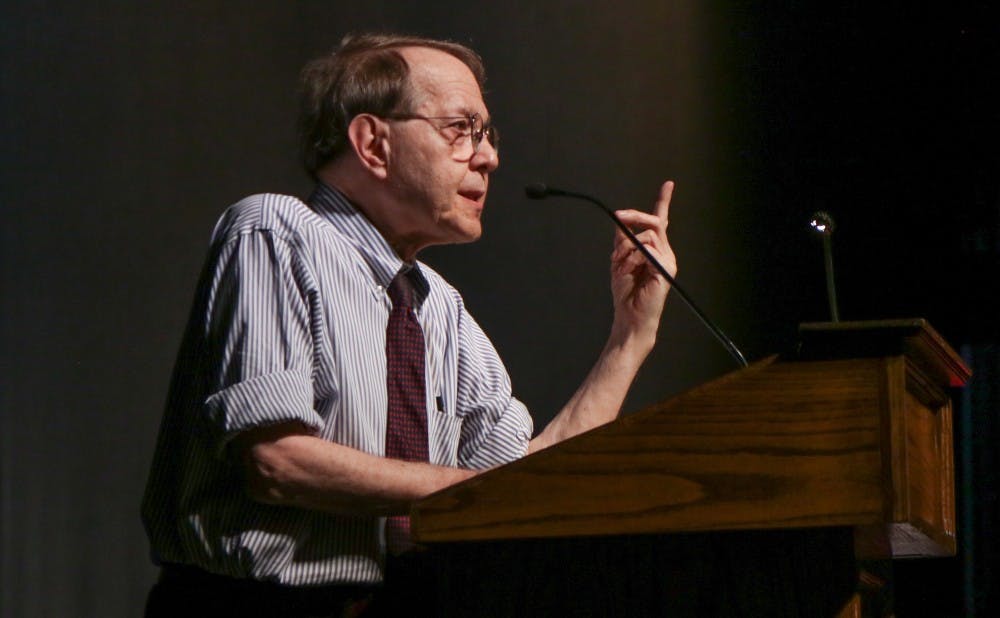To a nearly full Page Auditorium, writer and educator Jonathan Kozol shared his views on the negative effects of the growing charter school movement and excessive standardized testing.
Kozol, a leader in the field of education and advocate for creating equity in America’s public schools, has published multiple books on education since 1968—including "Savage Inequalities" and "The Shame of the Nation"—all of which have received honorable awards.
“Dr. [Martin Luther] King [Jr.] did not say I have a dream that someday the states in the North and the West and the East and the South will have anxiety-ridden, test-driven, rigidly-disciplined, poorly-operated, slightly-higher scoring, separate but equal schools,” Kozol said, to applause from the audience, about a quarter of whom were classroom teachers.
Kozol explained that there is no evidence that charter schools are on average better than public schools. He acknowledged that exceptional charter schools exist, but many of them have selectivity bias toward enrolling more motivated students. These charters also tend to “counsel out” kids that do not meet expectations and are more deeply segregated.
People who send their kids to private schools are subtracting themselves from the public struggle and are diminishing their civic virtue, he added.
Kozol told a story of having dinner with his liberal friends in New York, who spend $120,000 per year sending their two children to private school.
“They’re nervous with me because they’re afraid I’m going to redistribute their wealth, which I do,” Kozol said, to the which the audience laughed.
First-year Hira Shah praised Kozol's ability to use narrative and humor to capture the audience despite talking about such a serious issue.
“I think he does a good job of addressing of some very controversial issues to an audience where there might be some people on the other side in a way that’s playful enough for people to be able to still engage with what he’s saying without putting up their shields,” Shah said.
Kozol also talked about that fact that the word “happiness” is not mentioned in the debate on education, particularly the obliteration of happiness resulting from obsessive testing. The wealthiest schools are able to avoid the most harmful effects of standardized testing because testing is hardly mentioned during the school year.
However, principals of low-income schools are terrorized by meeting standardized test scores, Kozol explained. The principal’s simmering anxiety filters down to the teachers and the students, impacting the students’ mental health.
Kozol also advocated for universal pre-schooling in the United States. He noted that the wealthy are able to buy three years of early developmental education, which may cost up to $40,000 a year, but less than half of low-income children receive some pre-schooling. Kids with less time in preschool are less likely to perform well in school, yet most of the blame is placed on teachers, he noted.
“[Not having universal pre-school] is not just an act of thievery, it’s worse than that because it’s an irreversible theft because you can never give them back their childhood again,” Kozol said.
When Kozol was studying English literature at Harvard University, he said he was not interested in education in college. However, in 1964, the murders of three men who were attempting to help black citizens in Mississippi become registered voters suddenly changed Kozol’s career path.
Kozol visited his black community in Boston and asked one of the ministers what he could do to help. With Kozol’s education level, the minister said he should be a teacher. So, Kozol became a substitute teacher and then a fourth grade teacher in a broken-down school.
After noticing one girl who always sat in the back of the classroom—glaring at him—who he could never connect with, Kozol realized that the books they were reading did not incorporate African American culture, so he bought a book of poetry by Langston Hughes.
In class, he read the poem “Harlem” aloud to the students. The girl in the back of the class walked to the front, touched his arm gently and thanked him. She brought the book home and memorized the poem the next day.
“I was fired for curriculum deviation. Two weeks later, I was hired by the federal government for curriculum development,” Kozol quipped.
Special education teacher Antoinette Jordan, who attended the event, said that she wished the event was an all-day workshop with Kozol because he has a lot more to offer and could have enlightened more people about education. Although the talk was good, she noted that he was only able to touch the surface of the issues in education.
Bill Griffith, who was brought to the event because his wife works in Duke’s education department, has taught school for 14 years as a retirement job. He was interested in the conflict between the public education system and private or charter schools.
Get The Chronicle straight to your inbox
Sign up for our weekly newsletter. Cancel at any time.
“I think [the event] broadens our horizons. You can always learn something,” Griffith said.

